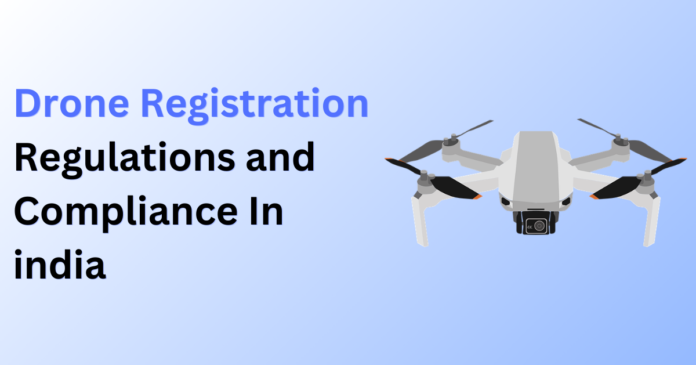Introduction:
As the popularity of drones soars to new heights, ensuring their responsible and safe operation becomes paramount. Drone registration is a regulatory measure implemented by aviation authorities worldwide to track and manage the increasing number of unmanned aerial vehicles (UAVs) in the airspace. This introduction provides an overview of why drone registration is essential and the key considerations involved.
Overview of Drone Registration Regulations:
Drone registration regulations are put in place by aviation authorities or governing bodies to ensure the safe and responsible operation of drones. These regulations vary by country, but they generally require drone operators to register their drones before flying them. The primary purpose of registration is to establish accountability and traceability, allowing authorities to identify and locate drone operators if necessary.
Differentiating Recreational and Commercial Drone Operators:
Drone registration regulations often distinguish between recreational and commercial drone operators. Recreational operators fly drones for personal enjoyment, while commercial operators use drones for professional purposes, such as aerial photography, inspections, or deliveries. It is important to understand the specific regulations and requirements that apply to each category, as they may differ in terms of registration procedures, restrictions, and compliance obligations.
Drone Registration Process:
Drone registration is a mandatory process in many countries, including India, to ensure responsible and safe drone operations. The registration process is designed to track and regulate drone usage, promoting airspace safety and security. Below is a step-by-step guide to the drone registration process:
1. Understand Regulatory Requirements:
- Research and understand the specific drone registration requirements in your country.
- In India, drone operations are regulated by the Directorate General of Civil Aviation (DGCA).
2. Eligibility and Categories:
- Check the eligibility criteria for drone registration.
- Different categories of drones may have varying registration procedures based on their weight and usage.
3. Choose the Right Category:
- Identify the category your drone falls under, such as nano, micro, small, medium, or large, based on weight and features.
4. Documentation Preparation:
- Gather necessary documents, including identification proof, address proof, and a passport-sized photograph.
5. Online Registration Portal:
- Visit the official registration portal provided by the aviation authority.
- In India, the DGCA has an online portal for drone registration.
6. Create an Account:
- Create an account on the registration portal using a valid email address.
7. Login and Fill Application:
- Log in to your account and fill in the required details in the online application form.
- Provide accurate information about the drone, its specifications, and your personal details.
8. Upload Documents:
- Upload scanned copies of the necessary documents, including identification and address proofs.
9. Pay Registration Fees:
- Pay the prescribed registration fees through the online portal.
- Fee structures may vary based on the category of the drone.
10. Receive Acknowledgment:
– Once the application and payment are submitted, you will receive an acknowledgement or reference number.
11. Verification Process:
– The aviation authority will verify the information provided in the application.
– This may involve background checks and confirmation of documents.
12. Issuance of Unique Identification Number (UIN):
– Upon successful verification, the aviation authority will issue a Unique Identification Number (UIN) for your drone.
13. Affix UIN to Drone:
– Affix the UIN prominently on your drone, as specified by regulations.
14. Adherence to Operational Guidelines:
– Familiarize yourself with and adhere to operational guidelines and restrictions set by the aviation authority.
15. Renewal and Compliance:
– Keep track of the registration validity period and initiate the renewal process before expiration.
– Ensure continuous compliance with any updates or changes in regulations.
16. Post-Registration Responsibilities:
– Responsible drone ownership includes adherence to safety guidelines, privacy considerations, and respectful operation.
It’s crucial to stay informed about any changes in regulations and maintain compliance to enjoy safe and legal drone operations. Always refer to the official aviation authority’s guidelines for the most accurate and up-to-date information.
Obligations and Responsibilities of Registered Drone Operators:
Once registered, drone operators have certain obligations and responsibilities to fulfill. These obligations may include:
- Displaying Registration Markings: Registered drone operators are typically required to affix registration markings or a unique identifier on their drones. These markings help identify the operator and facilitate traceability in case of incidents or accidents.
- Compliance with Airspace Restrictions: Drone operators must adhere to airspace restrictions and regulations set by aviation authorities. This includes respecting no-fly zones, maintaining a safe distance from airports, and avoiding sensitive or prohibited areas.
- Adhering to Safety Guidelines: Operators should follow safety guidelines provided by aviation authorities to ensure responsible and safe drone operation. These guidelines may cover aspects such as flight altitudes, line-of-sight operation, maximum flight distance, and avoiding hazards.
- Reporting Incidents: In some cases, registered drone operators are required to report any accidents, incidents, or near misses involving their drones to the relevant authorities. This reporting helps authorities assess safety risks and take appropriate actions if necessary.
Renewal and Updates:
Drone registrations are typically valid for a specified period, after which they need to be renewed. It is crucial for operators to keep track of their registration expiration date and initiate the renewal process in a timely manner. Failure to renew registration may result in penalties or legal consequences. Additionally, operators must update their registration information if there are any changes to their drone or operator details, such as modifications to the drone’s weight, color, or ownership. This ensures that the registration information remains accurate and up to date.
Compliance with Airspace Restrictions and No-Fly Zones:
Drone operators must be aware of airspace restrictions and no-fly zones to ensure compliance with regulations. Aviation authorities establish certain areas where drone operation is prohibited or restricted, such as airports, military installations, or densely populated areas. It is the responsibility of drone operators to familiarize themselves with these restrictions and avoid flying in prohibited zones. Some countries provide online tools or mobile applications that display interactive maps indicating no-fly zones and restricted airspace.
Privacy and Data Protection:
Drone registration involves providing personal information, raising concerns about privacy and data protection. Aviation authorities or governing bodies handle registration information with utmost care and follow applicable data protection regulations. They typically have measures in place to ensure the privacy and security of the data provided during registration. Drone operators should be aware of how their information is stored, used, and protected to ensure privacy and data security.
Consequences of Non-Compliance:
Non-compliance with drone registration regulations can lead to serious consequences. Penalties, fines, or legal actions may be imposed on drone operators who fail to register their drones or violate registration requirements. The severity of the consequences may vary by country and the nature of the violation. It is vital for operators to understand the potential repercussions and the importance of adhering to registration obligations to ensure responsible and legal drone operation.
Conclusion:
Drone registration regulations and compliance requirements are in place to ensure responsible drone operation and the safety of airspace. By registering their drones and adhering to the regulations, operators contribute to the overall accountability and traceability of drone operations. It is essential for drone operators to stay updated on the specific requirements in their respective countries and comply diligently to promote the responsible use of drones. By doing so, we can enjoy the benefits of drones while ensuring the safety, privacy, and well-being of everyone involved.
Read More – An Ultimate Guide To Develop Your Online Marketplace





